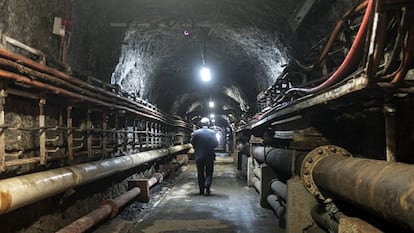Inside Gibraltar’s secret tunnels
A firm is using an historic WWII bunker to safeguard online gambling and financial data


Around half a kilometer under the Rock of Gibraltar lies a system of tunnels from where the Allies planned the North African landings during World War II.
Now, though, this underground network has been transformed into a digital data center where information about online gamblers and investors from all over the world is stored, zealously protected from cyber attacks by spectacular security measures.
Here customer data from clients as far flung as Bermuda, Bilbao and Hamburg is kept in colossal servers, hidden away from prying eyes. The tunnel system was the property of the British Ministry of Defence until 2008, when it was handed over to the Gibraltar government, which has since rented it out to a private company specializing in data management.
It is part of a network of more than 50 kilometers of tunnels that crisscross the interior of the Rock
Huge reels of cables and thick pipes covered in grease are stored in this kilometer-long passage. It is part of a network of more than 50 kilometers of tunnels that crisscross the interior of the Rock, which covers little more than six square kilometers. This is the only passage that runs from east to west and it is now a historic treasure trove: it was here that General Eisenhower formulated the assault on North Africa in late 1942. Maps from the time still hang on the walls in some of the command rooms.
The past now lives alongside cutting-edge technology, which is being used to garner profits from the booming online gambling industry based in Gibraltar. Financial services companies and e-commerce firms also store data here. Security is watertight: the area is monitored by CCTV and anybody entering the area must have special pass codes and keys.
Continent 8, the company that rents out digital storage space here, also provides sophisticated protection from hacking attacks, which can be carried out for political, criminal and economic reasons – blocking a competitor’s access to their clients can be highly lucrative for some unscrupulous firms. “These types of attacks are very common,” says a spokesman from the company’s headquarters on the Isle of Man, adding that the facility was subjected to around 35,000 cyber attacks in the first quarter of 2015 alone.
“We keep everything here: transactions, software, all meeting EU legislation,” says Gibraltar Gambling Commissioner Phil Brear. “Because if there is a court case and we are asked to provide information, we can find it here.”
He adds that lots of companies are based in the British Overseas Territory “for tax reasons” – online gambling contributes 20 percent to Gibraltar’s GDP, shared out among 30 companies.
The gambling sector employs around 3,500 people in Gibraltar from all over Europe, most of them multilingual. The majority of the online gambling companies are based on Europort Avenue, next to the marina. One building houses as many as eight different firms, whose busiest time of day is between 8pm and midnight.
One company, 32 Red, employs 60 people, whose job is to answer gamblers’ queries. Most of its multinational workforce lives in Spain, and crosses each day into Gibraltar, says office manager Ed Ware. The firm’s clients hail from all over Europe, and each nationality has its own peculiarities, he explains: Spaniards prefer poker, Italians bet on soccer, the British like bingo, while Eastern Europeans love roulette.
What these gamblers probably don’t know, however, is that when they type in their credit card number on their computer, the information is then stored in a former WWII operations center.
Tu suscripción se está usando en otro dispositivo
¿Quieres añadir otro usuario a tu suscripción?
Si continúas leyendo en este dispositivo, no se podrá leer en el otro.
FlechaTu suscripción se está usando en otro dispositivo y solo puedes acceder a EL PAÍS desde un dispositivo a la vez.
Si quieres compartir tu cuenta, cambia tu suscripción a la modalidad Premium, así podrás añadir otro usuario. Cada uno accederá con su propia cuenta de email, lo que os permitirá personalizar vuestra experiencia en EL PAÍS.
¿Tienes una suscripción de empresa? Accede aquí para contratar más cuentas.
En el caso de no saber quién está usando tu cuenta, te recomendamos cambiar tu contraseña aquí.
Si decides continuar compartiendo tu cuenta, este mensaje se mostrará en tu dispositivo y en el de la otra persona que está usando tu cuenta de forma indefinida, afectando a tu experiencia de lectura. Puedes consultar aquí los términos y condiciones de la suscripción digital.








































